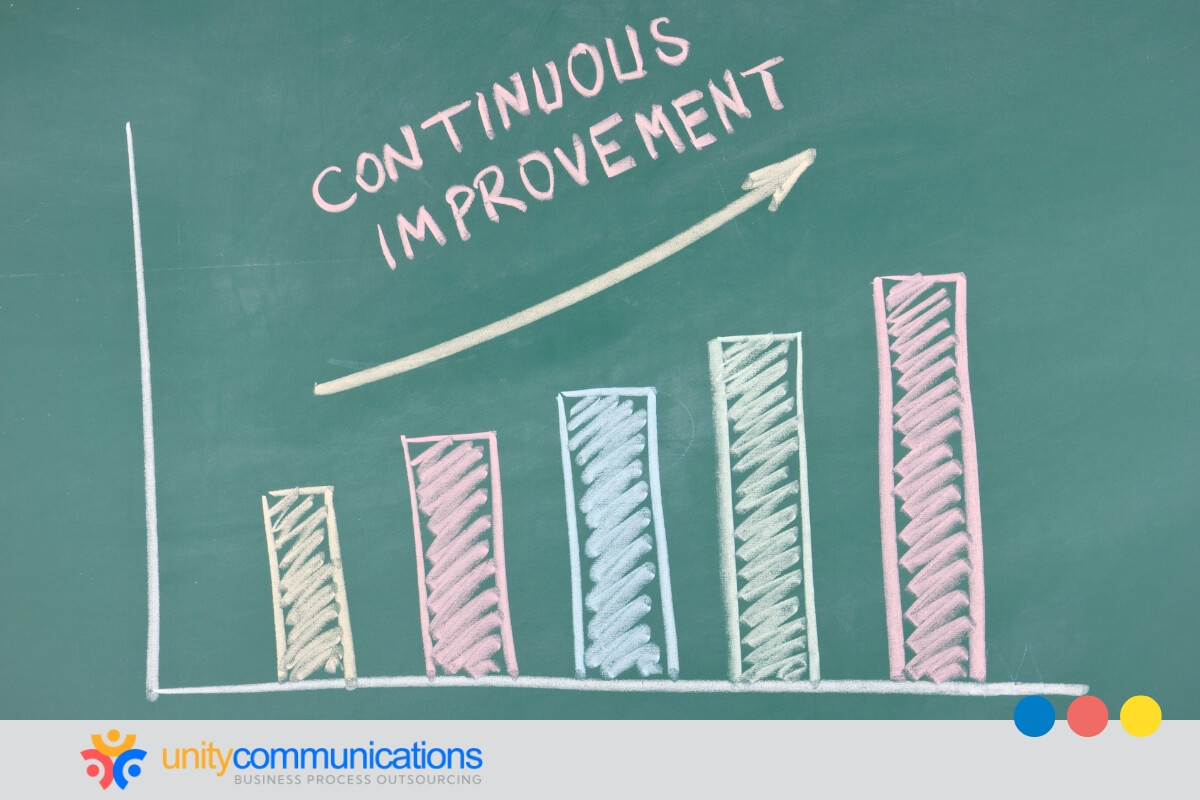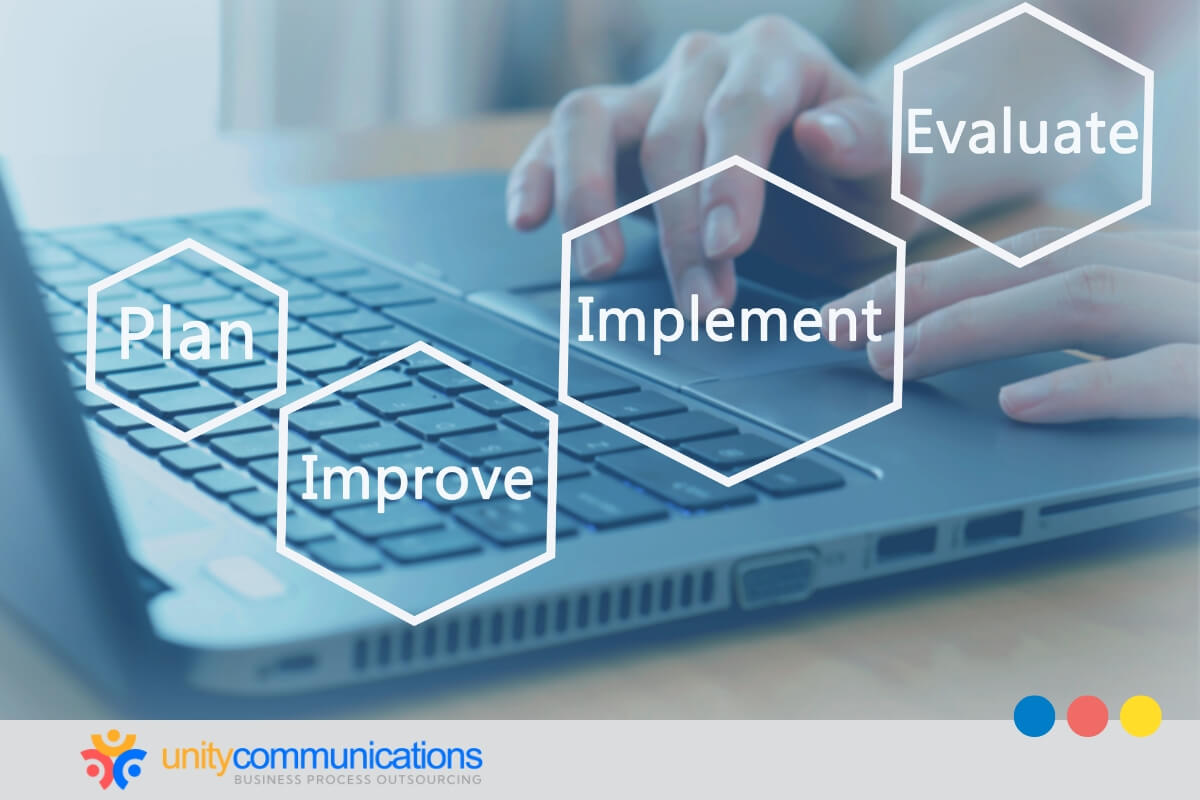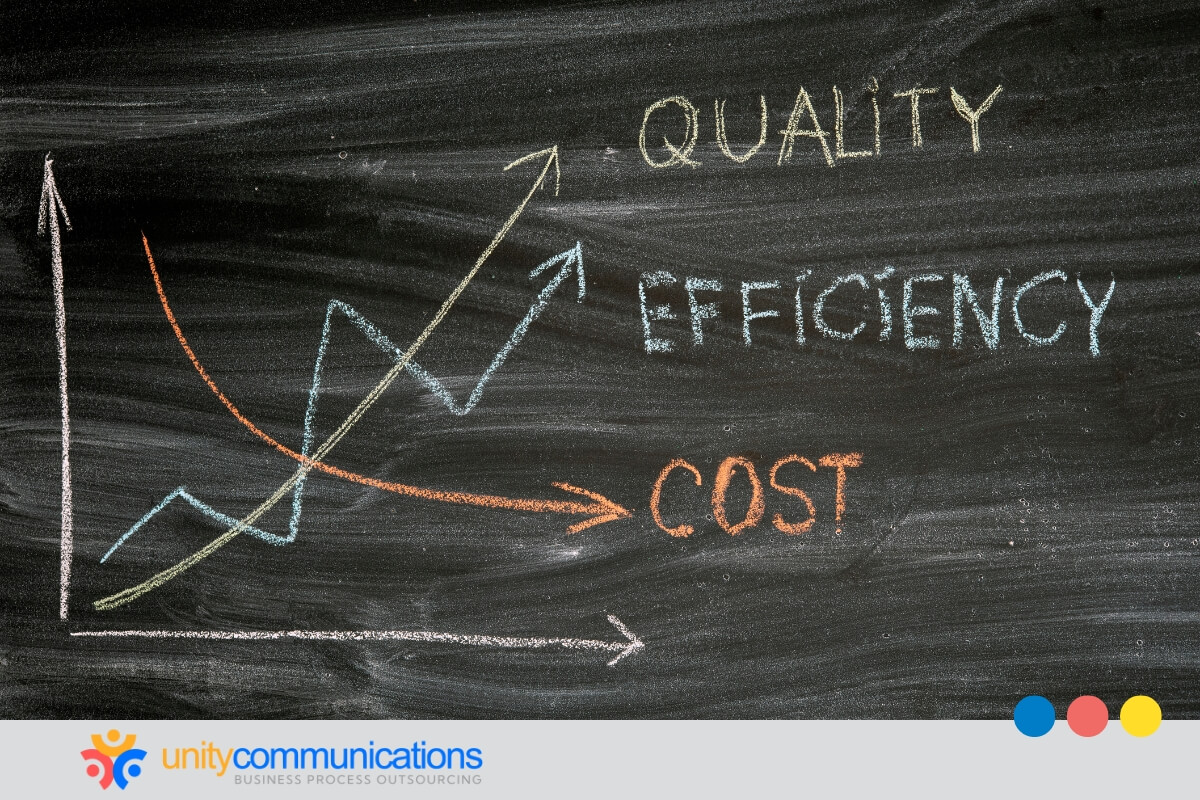Table of Contents
Learn more about outsourcing services for Phoenix businesses. Watch the video below.
In today’s business arena, partnering with a BPO company in Phoenix offers a strategic path for operational enhancements, cost efficiency, and growth. Smaller businesses avoid complex department setups by delegating intricate non-core functions to third parties.
In this scenario, outsourcing catalyzes process optimization and productivity. This strategy is no longer exclusive to a privileged few; instead, it is a readily accessible option for enterprises at various stages of growth. Its goal is to augment outcomes, curtail expenditures, and liberate management resources.
This article delves into the strategy’s transformative potential and how businesses achieve continuous improvement through outsourcing in Phoenix.
Outsourcing’s Potential in Driving Continuous Improvement

So, what is business process outsourcing (BPO)? It is a strategic practice where a company subcontracts specific processes or functions to an external service provider. It allows companies to focus on their core competencies while delegating non-core activities, such as customer service, human resources (HR), or information technology (IT), to specialized vendors.
BPO’s advantages include heightened efficiency, minimized costs, and boosted business performance. These benefits are possible by utilizing the third-party company’s expertise and resources. Small businesses in Phoenix continue to embrace outsourcing as a strategic move in the modern business environment.
Outsourcing trims costs and enhances operational efficiency, benefiting small businesses with resource constraints and complex non-core activities. It extends advantages across growth stages, elevating outcomes and redirecting focus toward advancement.
The continuous improvement of operational paradigms is outsourcing’s main impact on Phoenix businesses. From optimizing supply chains and leveraging specialized skills to fostering innovation, Phoenix-based small businesses harness the potential of BPO to encourage sustained progress.
But how does outsourcing boost efficiency?
Better Results in Non-core Operations
Outsourcing allows you to engage a proficient BPO company in Phoenix well-versed in the required services. The vendor often invests in research, technology, and personnel to excel in these functions. Instead of developing an in-house team, you can depend on third-party specialists for better results.
Delegating ancillary tasks to BPO providers lets small businesses allocate more time and resources to core missions, improving effectiveness and cost savings. An expert in back-end functions can continuously improve processes by streamlining workflows and reducing errors. Thus, outsourcing prevents weak management and inefficiencies in Phoenix businesses.
More Time to Focus on the Core
Small businesses in Phoenix that outsource resource-intensive functions are free from micromanaging tasks such as tracking and handling accounts payable.
Time is a valuable resource. Entrepreneurs gain strategic freedom by outsourcing operational tasks and sidestepping the intricacies of back-office management. This approach allows for a more profound operational perspective and time investment in high-value activities, culminating in improved client satisfaction and revenue growth.
Scaling Staff Capacity
Outsourcing can support your current in-house workforce by supplying specialists as needed. It enables the formation of a more strategic team. It also allows you to maximize your staff by filling in strategic roles to work alongside top personnel or adding workers without the burden of constant recruitment.
Additionally, outsourcing minimizes staff-related expenses and explores alternative and optimized service models. This financial efficiency includes cost savings since the BPO partner removes the need to pay for extra office space and high labor costs.
Outsourcing enhances financial flexibility while promoting continuous improvement in Phoenix. It also eliminates the burden of finding office space since the overall corporate vacancy rate across the Phoenix metro area is 26.1%.
Reduced Expenditures
Outsourcing to a Phoenix BPO firm with offshore operations does not just cut staff-related expenses by 70%. It also positively impacts the client company’s overall financial performance. Substantial savings are possible with no requirement for office space and potential access to more affordable labor.
Furthermore, outsourcing firms may leverage cost-effective labor, opening doors to new service approaches.
This newfound financial agility and effectiveness can significantly contribute to the expansion and development of small businesses in Phoenix, positioning outsourcing as a strategic avenue for continuous enhancement.
Strategies for Fostering Continuous Improvement in Outsourcing

The success of small and mid-sized businesses affects any state’s economic vitality. In Arizona, over 550,000 small businesses with less than 500 employees are operational. Small business owners in Phoenix can use outsourcing to grow revenue, increase capital investment, and foster continuous improvement.
Transparent communication is pivotal for successful BPO partnerships. To ensure continuous improvement through outsourcing, Phoenix businesses must prioritize clear communication. Embrace the following strategies:
1. Establishing Clear Communication Channels
Upon contract signing, responsible providers collaborate with clients to establish communication methods. Phoenix BPO providers offer fully developed, readily implementable communication algorithms. Reputable vendors also consider client-preferred communication channels, ensuring exceptional service and satisfaction.
Once you have decided on your communication channels, determine their information type. For instance, use email for reports, Google Meet for video conferences, and Slack for quick questions. Having dedicated channels for specific purposes enhances team focus and efficiency and minimizes distractions from non-urgent messages.
In-person meetings are preferred for discussing business and building relationships. However, working with an offshore service provider may limit physical interactions. Video conferencing offers a viable solution to bridge this gap, enabling a virtual closeness that fosters meaningful connections. It also supports the concept of continuous improvement through outsourcing in Phoenix.
2. Promoting Input and Teamwork
Outsourcing offers a cost-efficient method to tap specialized expertise and services tailored to your business needs. Nevertheless, it does pose certain hurdles, including communication gaps, quality concerns, and alignment challenges.
Effectively handling feedback is pivotal to nurturing a fruitful BPO partnership. Helpful feedback covers performance tracking, issue identification, collaboration improvements, and building trust with your service provider. Below, we present valuable strategies for adeptly managing feedback when outsourcing.
- Establish objectives and anticipated outcomes for feedback. Before partnering with a vendor, set realistic goals and expectations for feedback. Define scope, frequency, format, and roles. Establish methods for measuring progress. A comprehensive feedback agreement ensures effective collaboration.
- Provide valuable and punctual feedback. Constructive feedback should be factual and actionable, offering precise and objective suggestions. Timeliness is crucial for relevance. Avoid accumulating and voicing feedback after a project has ended. Effective feedback aids understanding and enables necessary adjustments.
- Foster the solicitation of feedback from your outsourced partner. Establish a two-way feedback approach, inviting insights from your BPO counterpart. The third-party team’s input can enhance your processes, systems, and strategies. Stay receptive to feedback to cultivate a relationship of trust and continuous improvement.
3. Regular Performance Evaluations and Goal Setting
Evaluating your BPO team’s effectiveness enables vigilant progress monitoring and aligns its methods with project goals. This step aids in promptly identifying and rectifying any deficiencies. Ultimately, it underscores the value of peak performance, signaling a dedication to achieving or exceeding anticipated results.
Below are key performance indicators (KPIs) to monitor for performance evaluation:
- Customer service levels. This specific KPI assesses the third-party team’s competence in providing standard customer service. It evaluates the duration from when a client initiates a call to when an agent addresses it. The average handling time (AHT), resolution, and abandonment rates fall within this category.
- Backlogs. Measuring backlogs in hours and converting them into weeks provides valuable insights, contributing to continuous improvement through outsourcing in Phoenix. An optimal backlog ranges from four to six weeks for daily and weekly tasks.
- Schedule compliance. Known as schedule adherence, this KPI evaluates timely task completion. It quantifies your BPO team’s commitment capacity by dividing actual task hours by total planned hours. Suppose the week begins on Monday. The compliance factor should encompass tasks scheduled by Monday.
- Quality. Quality refers to the level of excellence compared to similar companies. The net promoter score (NPS), a recognized metric, assesses product or service quality by gauging the likelihood of recommendations.
- Quantity. Projects driven by numbers and ratios use quantity KPIs. Counting offers a direct method to quantify observations, such as satisfied customers or total sales. Percentages are valuable for evaluating the alignment between performance outcomes and the target population.
- Process. Process metrics concentrate on efficiency, evaluating task execution by comparing systems and procedures to objectives. A balanced scorecard is a common tool for aligning worker performance with project goals. High-level KPIs oversee the overall progress, while low-level KPIs assess processes in departments such as sales.
These metrics are useful for non-numerical assessments. They emphasize the significance of continuous improvements and outsourcing’s ability to enhance productivity and efficiency for Phoenix clients. Enjoy quality and hassle-free outsourcing when you opt for a BPO company in Phoenix.
Below are tactics for assessing the effectiveness of an external team:
- Assess your professional relationship. A successful professional relationship requires clear expectations. Designate a point of contact for consistent communication. Doing so lets you efficiently track task progress and ensure timely and budget-friendly client deliverables.
- Examine their approach to system maintenance and management. Ensure your chosen provider meets your company’s requirements, boasting up-to-date IT infrastructure, robust phone and internet connectivity, and increased accessibility via various channels. Address time zone disparities through consistent communication.
- Notice how they communicate. Ensure your BPO team communicates effectively and updates you on system issues for prompt resolution. Workplace failures often result from poor communication and collaboration. Designating a point person ensures smoother operations, preventing escalations.
- Aim for transparency. Confirm if your third-party team provides accessible documentation and a client portal for issue tracking. Assess their transparency in sharing positive and negative insights to evaluate performance.
- Develop the practice of consistently following up. Regular follow-ups are critical when collaborating with an external team. Communication issues lead to delayed results. Implementing a structured follow-up process ensures progress alignment and optimized outcomes, mitigating disruptions caused by inadequate communication.
- Hold them responsible for the output and outcomes they commit to delivering. In outsourcing, the provider’s proposal outlines the expectations you should assess them against. Regardless of their workload, you must receive committed support and services. The Objectives and Key Results (OKR) framework is a tool for tracking performance.
The Importance of Continuous Improvement for Small Businesses

Phoenix has an inviting business landscape. Many locally based resources can help owners foster continuous improvement by providing additional support.
Continuous enhancement involves monitoring existing procedures and making gradual adjustments, accumulating into substantial outcomes. By recognizing areas for enhancement, you can establish a more efficient workflow and reduce time and resource consumption, ultimately boosting your small business’s productivity.
This approach aligns perfectly with outsourcing’s return on investment for Phoenix businesses, where the ongoing pursuit of refinement drives greater operational efficiency. This change creates a cycle of positive transformation that contributes to your small business’s overall success and growth in the dynamic landscape of Phoenix.
Enhancing the quality of your product or service becomes achievable through defect elimination and process optimization. You improve customer satisfaction and maximize the potential to yield long-term financial benefits by minimizing the requirement for rework and replacements.
Furthermore, the continuous improvement approach can generate cost advantages in various dimensions besides waste reduction. For instance, you can lower your inventory demands by refining your processes. Additionally, identifying errors earlier helps you avoid the expenses associated with mistakes.
Back-office outsourcing enhances these advantages for small businesses, unlocking increased cost savings, operational efficiency, and strategic focus. By delegating non-core tasks to specialized service providers, companies tap into expertise, optimize resource allocation, and boost growth with streamlined processes.
The Bottom Line
Assessing your external team’s performance allows you to pinpoint areas for improvement, ultimately contributing to your project’s success. You can evaluate your provider’s performance by utilizing various metrics and strategies and gaining insights to enhance operational management.
Unity Communications offers excellent outsourcing services for those considering Philippines-based BPO and contact center as a service (CCaaS) solutions.
Let’s connect to learn more.



